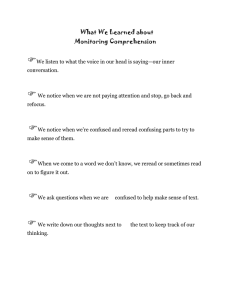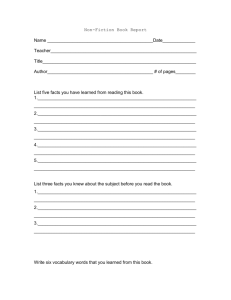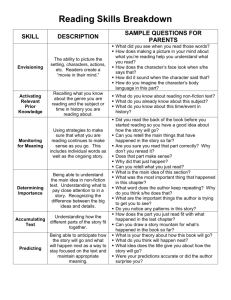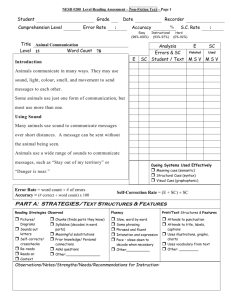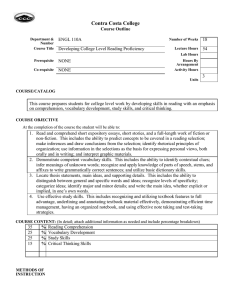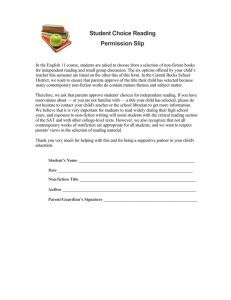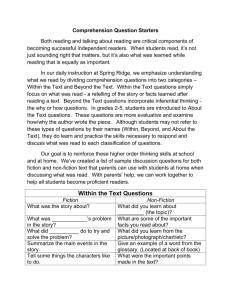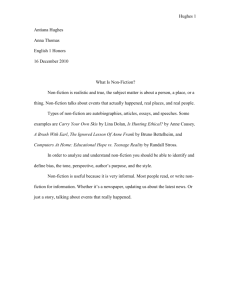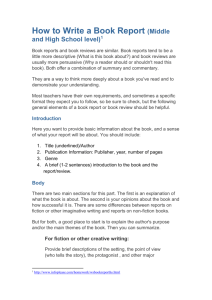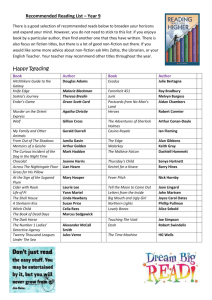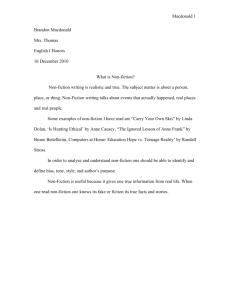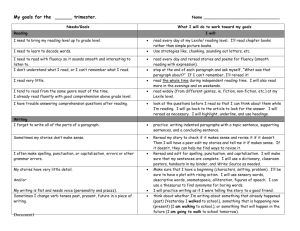7 STRATEGIES OF COMPREHENSION FOR READERS
advertisement
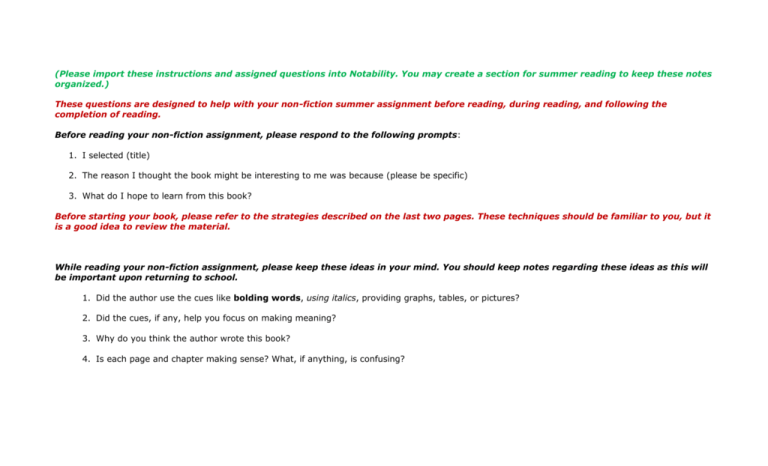
(Please import these instructions and assigned questions into Notability. You may create a section for summer reading to keep these notes organized.) These questions are designed to help with your non-fiction summer assignment before reading, during reading, and following the completion of reading. Before reading your non-fiction assignment, please respond to the following prompts: 1. I selected (title) 2. The reason I thought the book might be interesting to me was because (please be specific) 3. What do I hope to learn from this book? Before starting your book, please refer to the strategies described on the last two pages. These techniques should be familiar to you, but it is a good idea to review the material. While reading your non-fiction assignment, please keep these ideas in your mind. You should keep notes regarding these ideas as this will be important upon returning to school. 1. Did the author use the cues like bolding words, using italics, providing graphs, tables, or pictures? 2. Did the cues, if any, help you focus on making meaning? 3. Why do you think the author wrote this book? 4. Is each page and chapter making sense? What, if anything, is confusing? After completing your book, please thoughtfully respond to the following prompts. 1. What is the “big idea” of this book? 2. From the reading, what fact, statement, or new understanding is most important to you? Please provide quotations and page numbers. 3. How do you think the information from this book could make a difference to you as an eighth grade student? Why? 4. When you return to school, what would you most like to discuss with other readers of this book? Please provide specifics including quotations, page numbers and or chapters and ideas. Don’t forget to review the 7 strategies of comprehension as described on the following pages. 7 STRATEGIES OF COMPREHENSION FOR READERS From Ellin Keene MONITOR FOR MEANING DETERMINE IMPORTANCE CREATE MENTAL IMAGES SYNTHESIZE Does what I’m reading make sense? – do I need to reread or discover a word meaning? Why am I reading this? Do I need to pay strict attention to every word or can I skim? If I’m having trouble getting the meaning – where is my problem? Is it just a word or is it the whole paragraph? Can I tell what the author thinks is important? What do I think is important? Highlight and/or make notes of what is most important as I read along. Go back and reread those passages that are most important. Am I using all five senses when I read? Can I imagine what the place I’m reading about might smell like? How the food the characters eat might taste? What does the place sound like? How rough the walls of a prison cell might feel? What might the setting look like if I were to be there right at that time? Am I thinking about what I’m reading as I’m reading? Do I revise my thinking as I read further? How would I feel if I was in the situation? Am I paying attention to text patterns such as chronology of events, cause & effect, and problem/solution as I read nonfiction? Is the part that doesn’t make sense important? If not, can I read on and come back to this part later? Does everything else I’m reading make sense? If I “think aloud” about what I’m reading is it clearer? Why do I think this material is the most important? Can I defend my belief? If I determine something to be unimportant, have I ignored it? Can I defend that belief? If I was a movie maker how would I film this? As I read on, do my mental images change? How and why? Am I paying attention to characters, settings, conflict, sequence of events, resolution, themes, and symbolism as I read fiction? Am I using the elements of the text to help make decisions about the overall meaning? RELATE IT TO SOMETHING KNOWN (prior knowledge/schema) Am I connecting what I’m reading to something I already know about the subject? As I read am I paying attention to whether the text connects to what I already know or if it changes what I thought I knew? How does what I’m reading connect to what I know about the world? (text to world) How does what I’m reading connect to what I know about text structure/organization? (text to text) What do I know about my personal reading tendencies and styles? How am I using what I already know to make more sense of this reading? QUESTION INFER Am I able to question before, during, and after reading to make the material more meaningful to me? As I read do I use clues to predict what might happen next? Am I able to analyze and interpret not only what I’m reading, but what it all means? Do my questions clarify meaning? Help me guess what might be coming next in the reading? Help me determine the author’s intent with the text? Locate a specific answer in the text? Or help me think about questions the text itself might raise? Am I thinking critically about this text? Asking myself why the author is writing or not writing about something in particular? If someone else asks a question about the text, do I know whether or not the answer is explicitly stated in the text? What other information to answer a question might I need? Can I talk to my friends and teacher to compare my predictions, conclusions, analysis, and interpretations of the reading? Am I “reading between the lines”?
